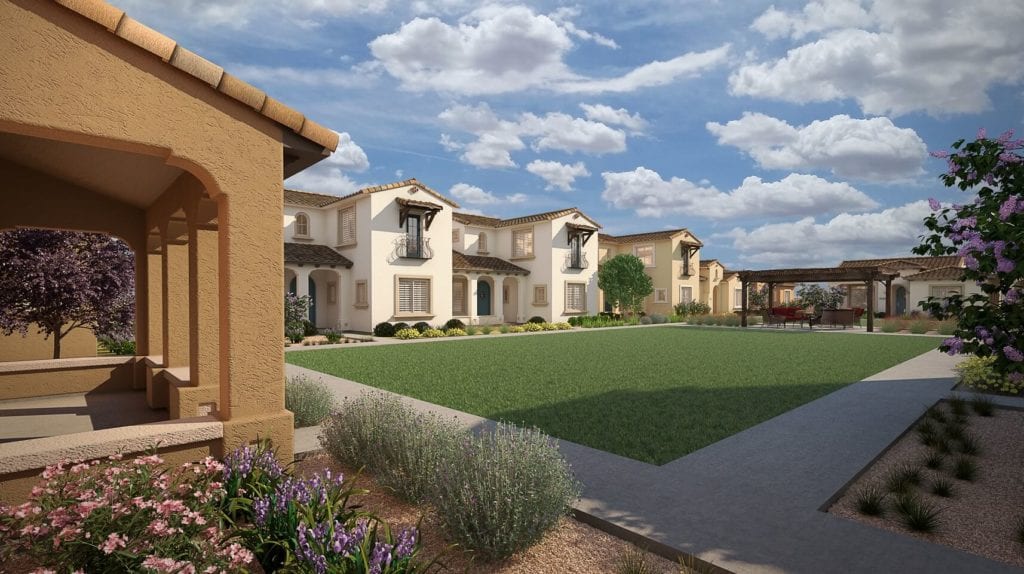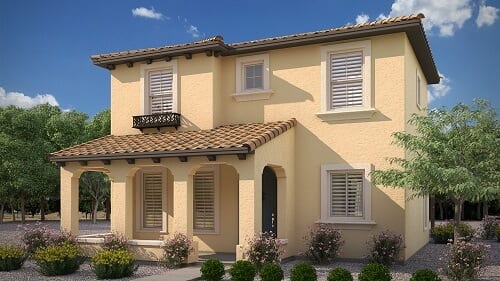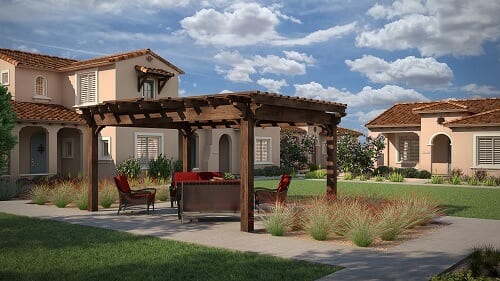Luna Azul in Phoenix, AZ is the country’s first planned community designed for adults with special needs

When Mark Roth’s daughter Emma turned 13, he started thinking ahead to what her adult life would look like. Unlike other families who prepare for college and a career path, Roth was trying to envision a future in which Emma’s special needs could be addressed yet allow her to live independently.
“As an experiment, we budgeted for 45 years of rent at $3,000 per month, which is actually somewhat low in many areas for an ‘inclusive apartment,’ ” says Roth, president and CEO of Scottsdale-based ECC Management LLC. “Even if the rent never went up, we were looking at $1.6 million just for housing.”
After looking at group homes, a farm and apartments that might work as a future home for their daughter, Roth decided to think about what he would build if he had unlimited money. The result is Luna Azul, a 30-home community in North Phoenix, which will eventually be Emma’s home. Luna Azul is the first for-sale development in the country designed for adults with disabilities. The community, which is open to anyone, includes security and 24-hour staff, who will plan inclusive neighborhood functions.

“One of the things I’ve learned as a parent of a child with special needs and while helping other families with special needs is that everyone is scared for the future of their kids as adults,” says Bobbi Desai, a real estate agent with Century 21 Redwood Realty in Loudoun County, Va., who is known as “Special Agent Bobbi” for her work with families with special needs. “Group homes and apartments are not always ideal, so everyone needs to plan for how their adult children will live, particularly after their parents are no longer with them.”
Desai hopes that Luna Azul will become a model community that can be replicated nationwide, particularly because of the ability of families to build equity in their homes.
“It would be great to have a development for parents of young children with special needs so that parents can share resources and support each other, while children can have a social life with others with similar needs,” Desai says.
7 Features for Special Needs Adults

At Luna Azul, about half the homes already have reservations, and residents anticipate moving in the summer of 2019.
Roth identified the following seven priorities for the project:
1. Safety
Unlike institutional living, the adults at Luna Azul are free to come and go on their own schedule. The gated community will have a controlled entry so that staff will know when residents come and go. “The 24-hour staff is in place for the extra level of safety, so we’ll know the residents’ schedules and we’ll have people walking the grounds to make sure everyone feels safe,” says Rex Matthews, community director for Luna Azul.
2. Permanence
The stability provided by homeownership and the ability to sell a home if desired provides financial security to the residents.
“The cottages are all owned by the residents who hold title to them and therefore have the right to live there as long as they choose,” Roth says.
3. Inclusive environment
Perhaps the most important element of Luna Azul, Matthews says, is the planned social activities, where people with a variety of developmental disabilities, mental health issues, traumatic brain injuries or physical disabilities can live in a welcoming community.
“The isolation of adults with disabilities is heartbreaking,” Roth says. “I hated the thought of Emma not being invited to the neighborhood pool party or being trapped someplace because she doesn’t drive. This community will include people with a variety of abilities who expect to see others who are disabled.”
4. Maximization of independence
The homeowner’s association will provide things like handyman services as well as grounds maintenance and community activities, but each resident can determine for themselves what other services they may need in their home. Residents can choose to attend dances or exercise classes or to participate in clubs, but they’re not mandatory.
“We have a mother and son moving in and another resident with live-in staff to help with daily needs, but each person can choose how they want to live,” Matthews says. “We also have a couple of people who work full-time and have mild development disabilities and want to live here because they’re isolated socially.”
5. Control over environment
Like other homeowners, the residents can choose to paint a room purple and decorate however they wish, Roth says. They can also decide to rent one or more bedrooms to housemates or bring in a pet.
6. Urban location
Luna Azul’s location in Phoenix allows residents access to jobs and to entertainment such as movies and museums, which Roth preferred over the isolation of a more rural area.
7. Affordability
The two- and three-bedroom cottage-style homes, priced from the mid-$300,000s to mid-$500,000s, represent a savings over long-term rentals, Roth says. Buyers can finance the homes with a 10 percent down payment through a Fannie Mae program. Monthly HOA fees are relatively high compared to other communities, at $550 per bedroom or $1,100 to $1,650 per house. The fees include 24-hour security as well as staff to provide social activities and other support services as determined by the HOA and residents.
Cottage Living

The 1,152- to 1,956-square-foot homes are designed with front porches and are situated close together to encourage socializing with neighbors.
While the clubhouse is ADA-compliant, the houses are designed with low-threshold entrances to be visitable by people with mobility issues but don’t include ramps. Buyers can customize the homes to meet their needs.
“Our goal is to make this a vibrant community for people across the spectrum of functionality from profoundly disabled to highly functional,” Roth says. “We envision all kinds of events and lectures by experts and interesting activities. We’ll invite others from outside the community to participate in some of it.”
Replication of Luna Azul in other areas is a possibility once the Phoenix community is established.

Michele Lerner is an award-winning freelance writer, editor and author who has been writing about real estate, personal finance and business topics for more than two decades.

 Buying New Construction: Home Buying Tips
Buying New Construction: Home Buying Tips